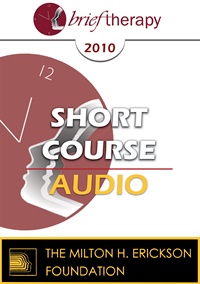
- Average Rating:
- Not yet rated
- Topic Areas:
- Children and Adolescent Therapy | Short Courses | Eating Disorders | Anorexia | Brief Therapy
- Categories:
- Brief Therapy Conference | Brief Therapy Conference 2010
- Faculty:
- Christine Silverstein
- Duration:
- 1:28:27
- Format:
- Audio Only
- Original Program Date:
- Dec 09, 2010
- Short Description:
- For centuries, clinicians have been baffled as to how to achieve healthy outcomes in the treatment of anorexia nervosa. In this workshop, the presenter will describe how she assisted a nine-year-old female soccer player, who experienced disordered eating. The techniques used to facilitate performance, such as goal-setting, mental rehearsal, and positive selftalk, will be explained, as well as unique approaches with Ericksonian hypnosis and imagery. The use of puppetry, which was an adjunct to Parts Therapy, will be demonstrated. With Christine Silverstein.
- Price:
- $15.00 - Base Price
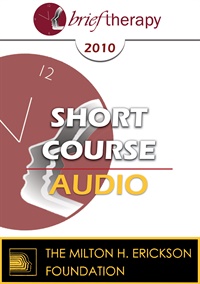
- Average Rating:
- Not yet rated
- Topic Areas:
- Family Therapy | Short Courses | Children and Adolescent Therapy | Brief Therapy
- Categories:
- Brief Therapy Conference | Brief Therapy Conference 2010
- Faculty:
- Bob Bertolino, PhD
- Duration:
- 1:31:15
- Format:
- Audio Only
- Original Program Date:
- Dec 09, 2010
- Short Description:
- A Strengths-Based Therapy approach provides practitioners with essential principles and practices for improving effectiveness and outcomes with adolescents and families. Participants in this workshop will be introduced to current research findings on effective practice and will learn key strategies to strengthen the therapeutic relationship and alliance, maximize client contributions to change, and respond efficiently to client progress. The strategies offered can be applied to a wide range of settings with a continuum of concerns.
- Price:
- $15.00 - Base Price
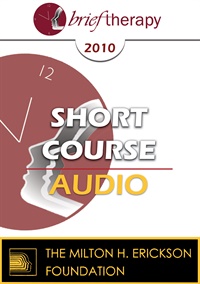
- Average Rating:
- Not yet rated
- Topic Areas:
- Children and Adolescent Therapy | Short Courses | Brief Therapy | Hypnotherapy
- Categories:
- Brief Therapy Conference | Brief Therapy Conference 2010
- Faculty:
- Charlotte Wirl
- Duration:
- 1:20:50
- Format:
- Audio Only
- Original Program Date:
- Dec 09, 2010
- Short Description:
- Brief hypnotherapy is particularly suited for children and adolescents with psychosomatic disorders, because it exploits their natural abilities to fall into trance and uses a language of symbols and metaphors. It is based on the Ericksonian belief in the abilities of a child and is astonishing in its effectiveness. With Charlotte Wirl.
- Price:
- $15.00 - Base Price
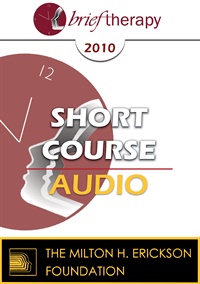
- Average Rating:
- Not yet rated
- Topic Areas:
- Anxiety | Children and Adolescent Therapy | Short Courses | Brief Therapy
- Categories:
- Brief Therapy Conference | Brief Therapy Conference 2010
- Faculty:
- Carme Timoneda-Gallart
- Duration:
- 1:16:36
- Format:
- Audio Only
- Original Program Date:
- Dec 09, 2010
- Short Description:
- This workshop will present some practical cases in order to illustrate the brief therapy process applied to children affected by emotional disorders as anxiety, headaches, loyalty conflicts and learning emotional blockages. In all cases, Ericksonian techniques such as metaphors and symptom prescription have shown very positive and efficient results. With Carme Timoneda-Gallart.
- Price:
- $15.00 - Base Price
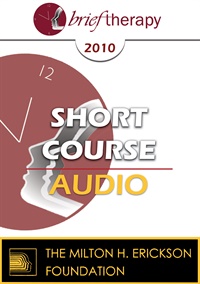
- Average Rating:
- Not yet rated
- Topic Areas:
- Short Courses | Autism | Brief Therapy | Children and Adolescent Therapy | Personality Disorders
- Categories:
- Brief Therapy Conference | Brief Therapy Conference 2010
- Faculty:
- Sherri Reynolds
- Duration:
- 1:20:40
- Format:
- Audio Only
- Original Program Date:
- Dec 09, 2010
- Short Description:
- Participants will learn greater depth of knowledge around diagnosis of autism through infancy and childhood, including differential diagnosis. Participants will also be taught about the various treatment modalities. All functioning levels will be discussed. Most importantly, participants will be taught strategic interventions to address specific core issues in clients with autism. Participants will learn safety and tantrum protocols to help with aggressive or severe tantrums. With Sheri Reynolds.
- Price:
- $15.00 - Base Price
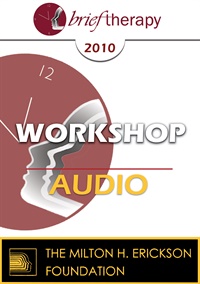
- Average Rating:
- Not yet rated
- Topic Areas:
- Trauma | Children and Adolescent Therapy | Family Therapy | Workshops
- Categories:
- Brief Therapy Conference | Brief Therapy Conference 2010
- Faculty:
- Kenneth Hardy, PhD
- Duration:
- 1:38:18
- Format:
- Audio Only
- Original Program Date:
- Dec 09, 2010
- Short Description:
- BT10 Workshop 03 - Children, Families, and Trauma: A Relational Approach - Kenneth Hardy, PhD Ignoring the impact of the trauma on the client’s family overlooks powerful dynamics that are crucial to treatment outcome. Participants in this workshop will learn how to involve the trauma sufferer’s partner and other family members as resources in the healing process.
- Price:
- $15.00 - Base Price
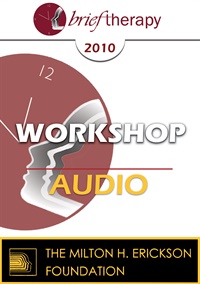
- Average Rating:
- Not yet rated
- Topic Areas:
- Anxiety | Children and Adolescent Therapy | Workshops | Brief Therapy
- Categories:
- Brief Therapy Conference | Brief Therapy Conference 2010
- Faculty:
- Lynn Lyons, LICSW
- Duration:
- 2:48:35
- Format:
- Audio Only
- Original Program Date:
- Dec 12, 2010
- Short Description:
- BT10 Workshop 39 - Brief Therapy for the Treatment of Anxious Children - Lynn Lyons, LICSW Anxious children, and often their parents, engage in predictable cognitive processes and coping strategies that create a cycle of avoidance, social isolation, and depression. This workshop will identify these common patterns, and focus on the development of interventions that help shift the anxious family toward flexibility, creativity, and the tolerance of uncertainty.
- Price:
- $15.00 - Base Price
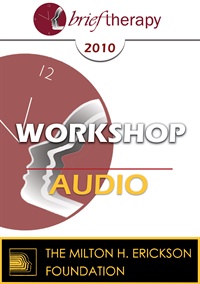
- Average Rating:
- Not yet rated
- Topic Areas:
- Hypnosis | Children and Adolescent Therapy | Workshops
- Categories:
- Brief Therapy Conference | Brief Therapy Conference 2010
- Faculty:
- Lynn Lyons, LICSW
- Duration:
- 2:39:54
- Format:
- Audio Only
- Original Program Date:
- Dec 12, 2010
- Short Description:
- BT10 Workshop 45 - Using Hypnosis with Children and Their Parents - Lynn Lyons, LICSW Hypnosis harnesses the powerful imaginations of children to interrupt problematic cognitive and physical patterns. Participants will learn how to use hypnotic techniques to manage common childhood problems, such as phobias, sleep issues, school/test anxiety, and fear of medical treatment. How to include parents as subjects and hypnosis “assistants” will be addressed.
- Price:
- $15.00 - Base Price
Tags: Children
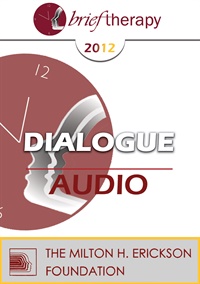
- Average Rating:
- Not yet rated
- Topic Areas:
- Dialogues | Brief Therapy | Children and Adolescent Therapy
- Categories:
- Brief Therapy Conference | Brief Therapy Conference 2012
- Faculty:
- Lynn Lyons, LICSW | Kenneth Hardy, PhD
- Duration:
- 56:40
- Format:
- Audio Only
- Original Program Date:
- Dec 07, 2012
- Short Description:
- BT12 Dialogue 11 - Brief Therapy with Children and Adolescents - Kenneth V. Hardy, PhD, Lynn Lyons, MSW Educational Objectives: Given a topic, describe the differing approaches to psychotherapy, and identify the strengths and weaknesses of each approach.
- Price:
- $15.00 - Base Price
Tags: Children Adolescents
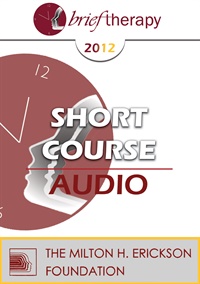
- Average Rating:
- Not yet rated
- Topic Areas:
- Hypnotherapy | Children and Adolescent Therapy | Short Courses
- Categories:
- Brief Therapy Conference | Brief Therapy Conference 2012
- Faculty:
- Tobi Goldfus, LCSW
- Duration:
- 1:18:00
- Format:
- Audio Only
- Original Program Date:
- Dec 09, 2012
- Short Description:
- BT12 Short Course 34 – Unplugging from the Outside in: Brief Strategic Hypnotherapy with Older Adolescents and Young Adults (Ages 16-25) – Tobi Goldfus, LCSW-C BCD With a plugged-in 24/7 cyberspace that demands and creates instantaneous response to internet and social networking, many young people have difficulty understanding self-regulation and present a lack of selfawareness and modulation. This workshop proposes a tailored strategic approach toward utilizing the natural creativity and novelty that young people have embedded in their development make-up but often have limited access toward using their inner resources. Experiential and specific ways to elicit responsiveness and enhance “down regulation” will be explored.
- Price:
- $15.00 - Base Price
Tags: Adolescents Children Hypnotherapy
Please wait ...

